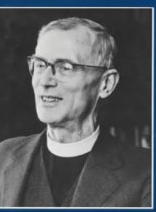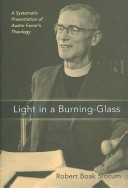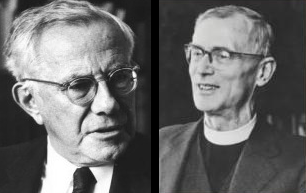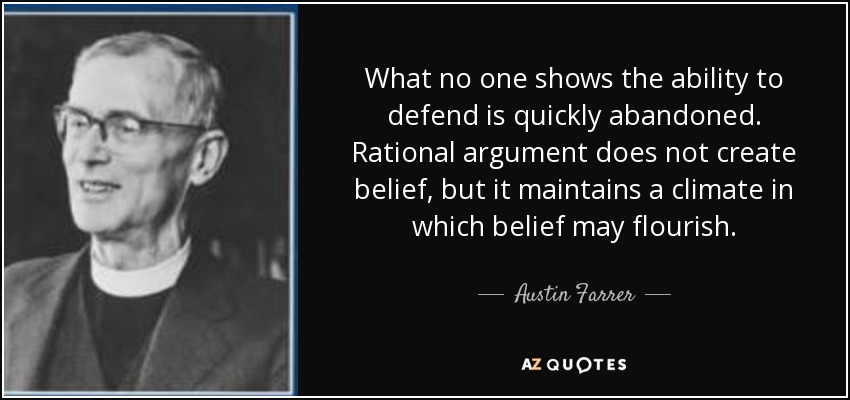Austin Farrer
Austin Marsden Farrer ( born October 11, 1904 in Hampstead ( London), † December 29, 1968 ) was an English theologian and philosopher. His theological and philosophical work and his efforts to spiritual questions earned him the reputation of being one of the outstanding figures in the Anglican Church of the 20th century.
Life
Farrer's parents, Augustus and Evangeline Farrer, had two daughters. His father was a Baptist pastor. Austin was raised in the Baptist faith and encouraged by his father to appreciate science and scholarship. But the young Farrer felt the divisions within the Baptist church and was a disappointment during his studies Anglicans. He attended St. Paul 's School in London, where he earned a scholarship to Balliol College, Oxford. As he mentally felt at St Barnabas Church in Oxford at home, his theology and spirituality was deeply influenced Anglo- Catholic, said she was more focused on the Anglican Book of Common Prayer as on ritual details. After he received top grades, he transferred to Ripon College Cuddesdon, a theological school, where he went through the training with the late Archbishop of Canterbury Arthur Michael Ramsey. He provided a board of trustees ( " curacy " ) in Dewsbury, West Yorkshire, after which he was invited in 1931 at St Edmund Hall, Oxford, to be chaplain and tutor. He became a member of the Academy and Kaplan at Trinity College of the University of Oxford 1935 until 1960. In 1959, a Chair ( the Regius Professor of Divinity ) was vacant, Farrer was concerned and has been thoroughly tested. His typological approach reading the Bible, however, known from his books on the Gospel of Mark and the revelation that was outside the mainstream of that Bible scholarship; finally saw his article on the " waiver of Q" ( orig.: 'On dispensing with Q') sensation on both sides of the Atlantic. So the theologian Henry Chadwick was set in its place. The following year, Farrer was appointed head of Keble College, Oxford. A post he held until his death shortly after Christmas 1968. Farrer was buried at the Holywell Cemetery, Oxford.
Work
In his research on the Biblical themes, he was considered independent and headstrong. So, he presented his own solution of the Synoptic question that continues to enjoy attention and followers: the Farrerhypothese. It applies in England as a serious alternative to the two- source theory and is especially represented by Michael Goulder and Mark Goodacre. However, Farrer's main work was philosophical. But even here, he did not follow the main stream of his empiricist contemporaries, such as John Wisdom, Gilbert Ryle Alfred Jules Ayer or. The " metaphysical " ( ' Metaphysicals '), as they called his small group of like-minded thinkers, was voted completely different. Farrer's thought was essentially Thomist. One of his close friends was the Christian apologist CS Lewis, who dedicated his book Reflections on the Psalms Farrer. This in turn gave the last rites to Lewis before his death. Other included J.R.R. Tolkien and Dorothy Sayers. So perhaps it is not surprising that Farrer was studied and admired more after his death in the U.S. than in his own country.
A greater contribution to Christian thought he made through his mind, 'double action ' ( 'double agency '), namely, that human activities are entirely ours, but just as God's work, albeit hidden perfectly. Farrer described God for such purposes as ' intelligent act '.
He was known as subtle preacher, preaching several books were printed - all on to one posthumously. He had the gift to connect a considerable erudition with a deep spirituality.
Publications
Farrer wrote several books on the Gospel of Mark, two commentaries on the Book of Revelation, a study of the temptation of Jesus under the title " The triple victory " (The Triple Victory ), philosophical works such as The freedom of the will, and finally Infinity and faith and speculation. The apologetic books include A Science of God, Saving Belief and a defense of God's goodness with the title " Almighty love and unlimited diseases: an essay on providence and evil "? ( Love Almighty and Ills Unlimited: an essay on providence and evil ). He also wrote a meditation on the Creed (Lord, I believe ) and numerous collections of sermons. Some of his articles have been collected and published.
Overview
Secondary literature
- Conti, Charles: Metaphysical Personalism. Oxford: Clarendon Press 1995.
- Curtis, Philip: A Hawk among Sparrows: a biography of Austin Farrer. London: SPCK, 1985.
- Duncan, Steven: The Proof of the External World: Cartesian Theism and the Possibility of Knowledge. Cambridge, James Clarke, 2008.
- Hebblethwaite, Brian, and Edward Henderson (ed.): Divine Action: Studies Inspired by the Philosophical Theology of Austin Farrer. Edinburgh: T & T Clark, 1990.
- Hefling, Charles: Jacob 's Ladder: Theology and Spirituality in the Thought of Austin Farrer. Cambridge, MA: Cowley, 1997.










